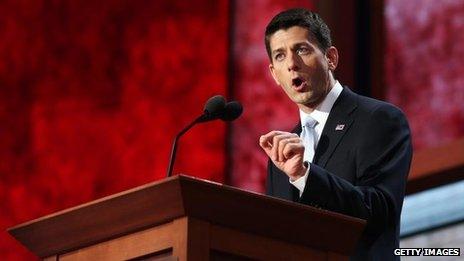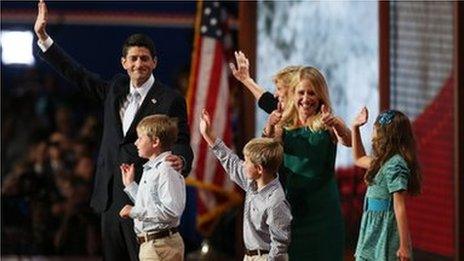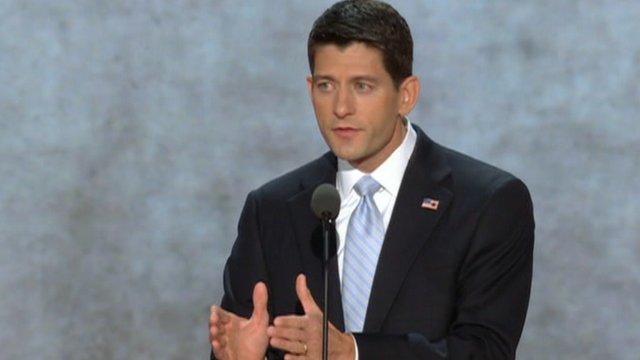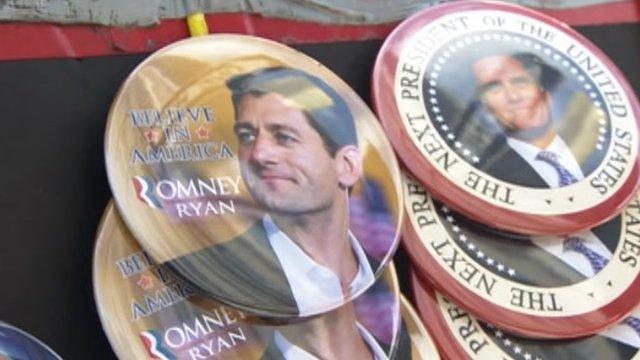Radical Republican Paul Ryan seeks to extend appeal
- Published
- comments

Some are comparing Mr Ryan to the patron saint of American Conservatives, Ronald Reagan
Paul Ryan's speech was a judicious mix of attacks on Obama's handling of the economy, praise for Mitt Romney, repeated promises to get the nation back to work and of course some family history, from introducing his children to praise for his widowed mum.
There were some very good lines.
"College graduates should not have to live out their 20s in their childhood bedrooms, staring up at fading Obama posters and wondering when they can move out and get going with life.
"Everyone who feels stuck in the Obama economy is right to focus on the here and now. And I hope you understand this too, if you're feeling left out or passed by: you have not failed, your leaders have failed you."
It perhaps had the feel of a speech that had been discussed at too many meetings, had suffered too many edits at the hands of too many spin doctors. Above all it was not scary, it was not the harsh speech of a man appealing to the base, but of one attempting to reassure the nation that his plans are rational and sensible.
He didn't need to appeal to the base here. That job is already done, and put him in his current position. He's already been accorded the highest accolade possible by some commentators who've compared him to that patron saint of American Conservatives, Ronald Reagan.
They see him as the future of the party.
Young, religious, blue-collar
In one such article, external the Wisconsin Governor Scott Walker is quoted as saying: "There's no doubt... win or lose, Paul Ryan's ideas will lead the party."
That excitement is overcoming common sense. Paul Ryan may have a very bright future. But it is far too early to say this, and far too early to predict the course of the ideological carnage that would follow defeat, or the more subtle struggle of ideas that would follow victory.
But you get the point that some people are very excited by Mr Ryan. There are the obvious reasons, that he is a good candidate for the Republicans. At 42, he's young. He's deeply religious. He's got a blue-collar and immigrant background. He's like the people who vote Republican.
But there is another reason for the excitement and the comparisons with St Ronnie. Mr Ryan is ideologically in tune with the base of his party, offering serious proposals to pare down the state. This party has changed since its 2008 defeat. During his presidency George W Bush was portrayed by the left as the embodiment of hard-line conservatism. Now he's seen by many in his party as a dangerously soft centrist. No-one would accuse Mr Ryan of that.
There is a crucial difference between Mr Ryan and Ronald Reagan. Even his best friends wouldn't call Ronald Reagan a policy wonk. He had a few simple ideas, communicated them brilliantly and pursued them relentlessly. But Ryan's reputation rests on his budget proposal, which he's given the grandiose sub-title, "a blueprint for American renewal".
It is highly political, a tactical masterpiece tickling his party's hot spots. One red button is slammed after another - a strong America, the need to support the troops , to defend free enterprise, the need to deal with the debt, to protect the constitution.
Romney's choice
But it is more than mere rhetoric. There is a plan, resplendent with numbers, graphs and details. Supporters say it is, external "offering serious solutions to gravely serious problems".
Some opponents have questioned whether it adds up. Others scorn its fundamental principles. In a blistering attack, external that combines psychology, philosophy and a dash of literary criticism Leon Wieseltier, external accuses Mr Ryan of "an intellectual style that is amateurish and parochial" and of believing in a version of self-reliance that is "cowardly", "dangerous", that would leave America "morally insolvent." Inspiring such a bravura hatchet job is an achievement in itself.
But he has done some thing else. There's often talk about a VP pick appealing to this state, or that demographic. Mr Romney's choice is far more important than that. By choosing Mr Ryan he has defined himself, and perhaps his presidency.
By choosing Mr Ryan he has told his party and the country he really is serious about radical conservative economic policies. If Mr Romney is elected, he will have at his side a VP who is more charismatic, more popular with the party, and more wedded to a right-wing agenda than he is. It could get interesting.
- Published30 August 2012

- Published30 August 2012

- Published29 August 2012
